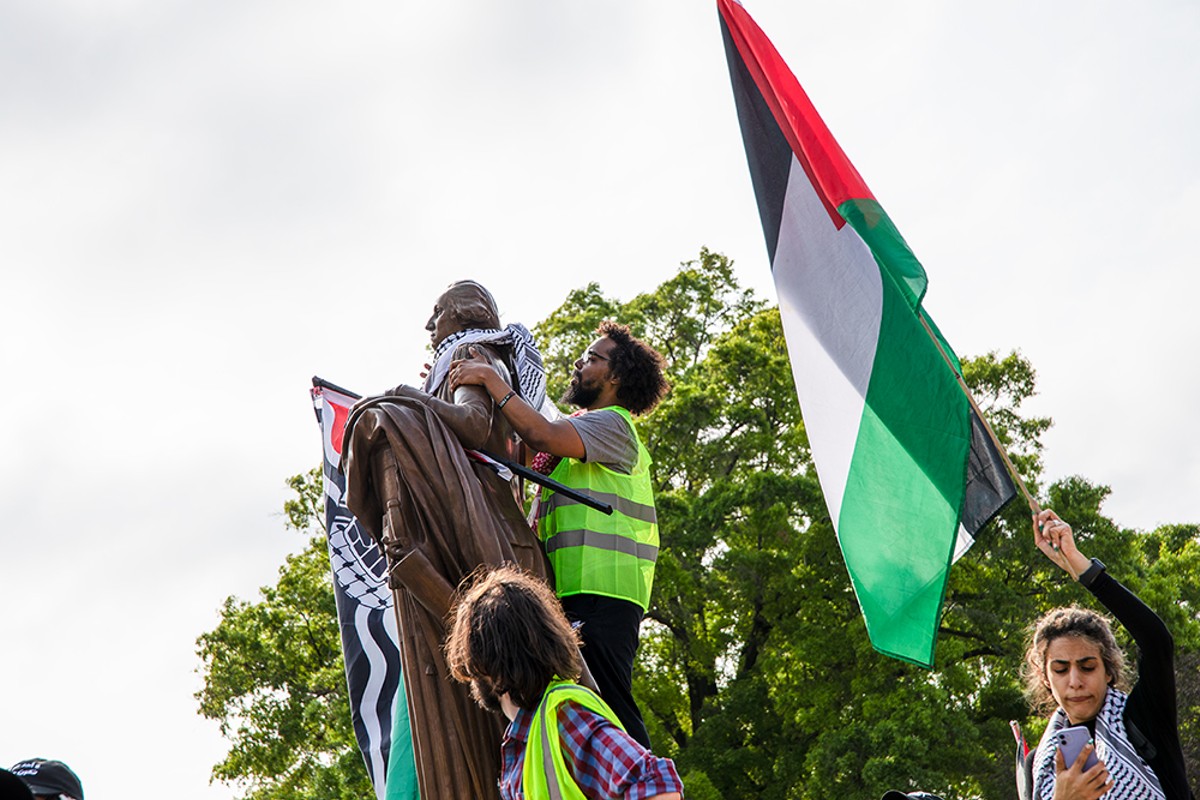Local News
Wash U Wants to Pay Tattletales to Film Alongside Campus Police

Are you an employee of Washington University looking for a paid gig after-hours that would allow you to rub elbows with the school’s boys in blue while also tattling on protestors? Well, the university has the perfect opportunity for you.
In an email allegedly sent to a group of university employees and subsequently leaked to the RFT, Wash U’s marketing & communications department says it has “a pretty urgent need” for one to two people who would be willing to “embed” with the Washington University Police Department to take video of tonight’s protest, which is planned for the edge of campus.
The email implies that one does not have to be an employee, or even affiliated with the university, to take advantage of the gig — the sender says they’re “mentioning it in case you know someone.”
“It does not have to be a professional photographer, just someone who’s comfortable in that environment and can capture video on an iPhone,” the email says.
Last Saturday, 100 protestors — 23 of them students and four faculty members — were arrested on campus, some of the video shot at the scene was embarrassing for the university.
The email says that the administration has reason to believe there will be a large protest coming to campus from Forest Park tonight. Several organizations have stated that they will be protesting at the corner of Lindell and Skinker at Forest Park beginning at 5 p.m. today.
Ahead of the protest, Ward 14 Alderman Rasheen Aldridge posted to X:
“The actions taken by@WUSTL towards its students and staff are unwarranted and extreme excessive aggression. Forcing students out onto the streets overnight is disgusting. Now, you will have to face us once tonight.”
Mayor Tishaura Jones also issued a statement ahead of the demonstration saying that the St. Louis Metropolitan Police Department will be present as long as the protest remains within city limits.
“We are hopeful that both the protesters and university administration can emulate the precedent set by Wednesday night’s protest,” Jones says in the statement. “It is our belief that there were two essential factors that helped to ensure the safety of all in the community: 1. The community centered the rejection of violence in their demonstration. 2. St. Louis University’s administration provided clarity to members of the SLU community regarding their expectations for the protest well before the scheduled start time.”
In its email seeking video help, which was apparently sent to at least one university department, Wash U says they need someone by 4 p.m. for a gig that could go as late as midnight, “or could be not at all if things go better than we’re preparing for.” The email also notes, “This is a paid gig (for a university employee we can work out a cash bonus, comp day, whatever).”
The email does not specify why they need someone to record the protest. It does however, say that WUPD is worn out (likely from sprinting after, and tackling, protestors). “We’re all hands-on-deck across the board,” it concludes.
Subscribe to Riverfront Times newsletters.Follow us: Apple News | Google News | NewsBreak | Reddit | Instagram | Facebook | Twitter | Or sign up for our RSS Feed
Local News
Mayor Wants Plan for Railway Exchange and Millennium Hotel by September

Mayor Tishaura Jones held a press conference this morning with Greater St. Louis Inc. and the St. Louis Development Corporation asking them to create a plan to address two troubled downtown buildings: the Railway Exchange Building and Millenium Hotel.
In a post to X (formerly Twitter) Jones said she asked the two organizations “to deliver a plan for bold action” to address the buildings, which she says have been neglected for far too long.
“We want downtown to be [a] place where you can feel safe doing something or nothing,” Jones added. “We also want downtown to be a place to work collaboratively and build camaraderie.”
In a press release, Greater St. Louis Inc. said, “In addition to developing a plan in the next 120 days for the Railway Exchange Building and the Millennium Hotel, city and business leaders announced that work to revitalize 7th Street between Ballpark Village and the America’s Center is slated to begin in the coming weeks.”
This area of downtown was recently featured in the Wall Street Journal, which referred to the area as a “doom loop.”
Last session the St. Louis Board of Aldermen passed Board Bill 130, sponsored by Ward 8 Alderwoman Cara Spencer, authorizing a blight study and eminent domain for the area encompassing the Railway Exchange building and an adjacent parking garage.
RFT photojournalist Zach Linhares recently tagged along with urban explorers visiting the Railway Exchange Building, which once held the Famous-Barr department store — and found multiple groups of bored kids from the suburbs in a wildly dangerous setting.
“Inside was a scene straight from John Carpenter’s 1981 film Escape From New York, famously filmed in St. Louis. Complete chaos. The place was pitch black, its glass panels smashed, with holes in every wall, collapsed ceilings, stairs falling apart, amateur graffiti on the walls and the remnants of wannabe arsonists trying to start fires,” he writes.
Subscribe to Riverfront Times newsletters.Follow us: Apple News | Google News | NewsBreak | Reddit | Instagram | Facebook | Twitter | Or sign up for our RSS Feed
Local News
Professor Suspended by Wash U After Protests Hears Only Silence

Aaron Neiman was excited to move to St. Louis for a job as a lecturer at Washington University.
His position in the anthropology department was his first job after earning his Ph.D.
Before the April 27 protest on campus, he’d accepted a different position with the university, one that would allow him to spend more time on his research.
But the demonstration resulted in more than 100 arrests, including at least four faculty members. Six faculty members including Neiman were suspended from the university, and ordered to have no contact with students or colleagues.
Now he has no idea what will happen to his employment, where he stands with the university, or if he will be able to continue to call St. Louis home.
The Protest
At the start of the afternoon of April 27, Neiman stood under a cluster of trees with students, community members, alumni and other faculty members, protesting Israel’s attacks on Gaza and Wash U’s ties to Boeing.
Neiman himself is Jewish, and sees his actions that day as allied with his heritage.
“I sort of see a through line between participating in the protests and Jewish values as such, you know, the idea that you have a responsibility to go and address wrong that you see in the world,” he says. “Why I attended that day specifically, was to support the students and to try to, if nothing else, show that they had support ideologically and materially, in terms of showing up … from at least some of their faculty.”
The protestors marched through campus and set up an encampment. Within about 30 minutes, Neiman says, police told protestors to disperse and they moved the encampment.
Police issued several warnings to disperse during the demonstration, but as afternoon turned to evening many police officers left and protestors began eating and praying. Then the officers came back, forming a line in front of the encampment and descended on the group, violently arresting dozens as the protestors locked arms around the encampment.
Neiman was one of the first to be pulled out of the circle and arrested. While Neiman wasn’t injured, the arrest was still violent.
“I was dragged, I was laying on my stomach. I was wearing a windbreaker because it started drizzling. I was picked up from the back by the hood so I couldn’t breathe briefly,” he says. Then he was walked to a waiting van for detainees. “It was a very chaotic moment. Lots of other people were also being arrested at the same time.”
They waited in the suffocatingly hot back of the paddy wagon for “at least an hour” as police continued to make round after round of arrest, he says.
The Aftermath
Neiman received his suspension letter from Wash U two days later. The letter from Provost Beverly Wendland is nearly a carbon copy of others shared with RFT and forbids him from contact with faculty or students.
It details some of the terms of his paid administrative leave, and towards the end of the letter includes this line: “Please note it is imperative that you not engage in any act of retaliation against anyone who provides information in connection with the investigation.”
Both Neiman and Brendan Roediger, the attorney advising him and a number of other impacted faculty, say it’s been nearly radio silence from the university since that initial letter.
No hearings have been spoken of or scheduled, Neiman says. On Monday (the same day as the university’s commencement ceremony), he and the other suspended faculty members lost all access to their university systems and email.
Neiman worries about the impact on his students.
“We have a lot of students going to med school, who I’ve promised letters to, and I outlined in the suspension appeal letter that this would be — they would be essentially collateral damage in this,” he says. “They either read it and didn’t care or didn’t read it because the email has been shut off.”
On May 7 Neiman sent the university’s Advisory Committee on Academic Freedom and Tenure a letter appealing his suspension. He has not received a response other than an acknowledgement that it had been received.
“This extraordinary punishment threatens to give students and colleagues the false impression that I am being investigated for a much more serious infraction — one that would genuinely threaten the safety of students or colleagues, for example interpersonal violence, verbal abuse, or untoward sexual contact,” he points out in the letter.
Roediger tells RFT that the response from the university and their decision to suspend Neiman is disproportionate given that university policy typically deploys suspension only to those who stand accused of much more serious offenses, such as threats of physical harm, sexual misconduct or being intoxicated on the job. Yet he’s been suspended even though his arrest has yet to result in criminal charges.
“The administration has not yet produced any evidence whatsoever demonstrating either the allegedly imminent threat I posed on April 27, or on the allegedly general threat I pose to the University community as a whole,” Neiman writes in his appeal. “Nor have criminal charges been filed with the relevant authorities on behalf of the Washington University Police Department, nor any of the other police departments involved in making arrests that evening. Indeed, it does not seem that there are any charges to be discussed at all. I urge the administration to substantiate the very serious claims made in Provost Wendland’s letter as soon as possible.”
Neiman adds that it would be wrong to suspend him for any implications that he was specifically dangerous to the Jewish community on campus as he stood with Pro-Palestine protestors because he is Jewish.
“My ancestors include Talmudic scholars, Holocaust survivors, shtetl peasants, and working-class Brooklynites,” he writes. “I was raised Jewish and continue to cherish my Jewish identity, even in these extremely fractured times for our people. I reject any implication that I pose a threat to fellow Jewish students or colleagues as itself an antisemitic negation of my Jewishness.”
Washington University did not respond to requests for comment. Previously, the university has said it cannot discuss personnel matters.
“There’s no communication and no sense of what this investigation entails or when it could possibly be over,” Roediger says.
Next Steps
Roediger, a Wash U alum, says the university’s silence and actions at the April 27 protest are new to the institution, but suspensions are not.
“The use of suspensions is sort of one of the primary tools of private universities around the country,” he says, noting that long-term suspensions create less risk for the university.
“It’s what [the] general counsel tells universities to do,” he says. “Put folks on paid suspension, make the process as vague and complicated and endless as possible, and in the meantime, we’ll figure out what the next steps are. And hopefully some of these people will just go away.”
Roediger takes issue with the university’s demand that suspended faculty have no contact with colleagues and students even off-campus. Roediger says he has never seen a clause like this implemented before, and doesn’t know how it could be.
“It’s not illegal to write that in a letter. I don’t know how one would enforce it,” he says.
No one knows what comes next, Roediger says.
“Everyone is afraid that they will still be in this status a month from now, two months from now, six months from now,” he says. “That … what Washington University wants is this: Nobody knows what’s happening. Nobody knows what the future holds.”
RFT asked Roediger if he anticipates suing Wash U on behalf of faculty members like Neiman.
“I certainly hope not,” he says. “These are folks who want to get back to serving their students and they want to give back to serving their students quickly. These are folks engaged in extensive research projects that they want to return to. These are not folks that are hungry for litigation. But if Washington University continues in the direction that it’s heading, it seems unavoidable.”
Subscribe to Riverfront Times newsletters.Follow us: Apple News | Google News | NewsBreak | Reddit | Instagram | Facebook | Twitter | Or sign up for our RSS Feed
Local News
St. Louis Man Is Innocent in 36-Year-Old Rape Case, Lawyers Say

The St. Louis Circuit Attorney’s Office has agreed to review the 1988 rape conviction of a man whose attorneys say was targeted by police.
Fredrico Lowe-Bey has been in prison for more than 30 years after being found guilty of raping a woman who was abducted in the early morning hours of May 21, 1988, in the city’s Tiffany neighborhood. The victim had gotten into a fight with her boyfriend and began walking home, but a man pulled up in a car, jumped out and dragged her into an alley, where he sexually assaulted her.
Lowe-Bey, then 27, was arrested the next day after the victim identified him, saying she recognized him “”from the neighborhood.” By the end of the year, he had been found guilty on three counts related to the attack, including forcible rape, forcible sodomy and tampering with a witness, and sentenced to 85 years in prison.
However, Lowe-Bey’s attorneys now say that he was targeted by two police officers, Rubin Haman and James Long, with whom he’d had prior run-ins.
Jamala Rogers, the executive director of Organization for Black Struggle, a criminal justice reform organization, says that the two arresting officers had it out for Lowe-Bey because he was a member of the Moorish Science Temple of America, an organization whose activities law enforcement have historically taken a keen interest in.
Lowe-Bey’s legal team includes Centurion Ministries, a New Jersey-based nonprofit, and Rick Sindel, a St. Louis-based attorney with a long history of post-conviction appeals.
A press release from Lowe-Bey’s attorneys says the two officers who arrested him for the rape had previously arrested him on “trumped-up” narcotics charges, a case that fell apart when it went to trial. Lowe-Bey had also previously filed an internal affairs complaint against the two men.
The 1988 rape arrest, Lowe-Bey’s attorneys say, was the result of Haman and Long’s “one year campaign to secure revenge on Lowe-Bey.”
The jury in 1988 was not allowed to hear about Lowe-Bey’s previous drug arrest by the two officers and the subsequent acquittal.
The attorneys also say that when evidence in the rape case was tested for DNA, there were no matches to Lowe-Bey. The victim in the case also reported her attacker had “scary” freckles; Lowe-Bey’s features are unfreckled.
Rogers says that during the case, the victim became a “pawn” of the prosecution. She has since passed, leaving what Lowe-Bey’s attorneys say is “a travesty of justice behind for a new circuit attorney to sort out.”
Lowe-Bey’s legal team previously presented the case for review to the Circuit Attorney’s Office when it was run by Kim Gardner, to no avail.
Under current Circuit Attorney Gabe Gore, the Conviction Integrity Unit is run by retired Missouri Supreme Court Justice George Draper.
Asked whether Gore’s office is taking wrongful conviction reviews seriously, Rogers says, “We’ll see.”
Christine Bertelson, a spokeswoman for Gore’s office, confirms that the Conviction Integrity Unit agreed to review the case, saying, “There is no timetable for the review process, which is just beginning.” In 1991, the officers behind Lowe-Bey’s arrest, Haman and Long, were at the center of a police brutality lawsuit after roughing up a 22-year-old woman while arresting her in the Fox Park neighborhood. A jury awarded the woman $10,000 in damages.
Subscribe to Riverfront Times newsletters.Follow us: Apple News | Google News | NewsBreak | Reddit | Instagram | Facebook | Twitter | Or sign up for our RSS Feed
-

 Entertainment1 year ago
Entertainment1 year agoSt.Louis Man Sounds Just Like Whitley Hewsten, Plans on Performing At The Shayfitz Arena.
-

 Business1 year ago
Business1 year agoWe Live Here Auténtico! | The Hispanic Chamber | Community and Connection Central
-
Board Bills1 year ago
2022-2023 Board Bill 189 — Public Works and Improvement Program at the Airport
-

 Local News1 year ago
Local News1 year agoVIDEO: St. Louis Visitor Has Meltdown on TikTok Over Gunshots
-

 News1 year ago
News1 year agoTed Lasso-inspired pop-up bar now open in St. Louis
-

 Board Bills1 year ago
Board Bills1 year ago2022-2023 Board Bill 165 — Jefferson Arms Community Improvement District
-
Board Bills1 year ago
2022-2023 Board Bill 183 — Amending Ordinance Number 62885 known as the Capital Improvements Sales Tax
-

 News10 months ago
News10 months agoGas tanker crashes into St. Louis Metro transit center





